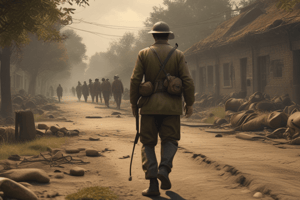Podcast
Questions and Answers
What is the primary focus of historiography?
What is the primary focus of historiography?
- The actual events of the past
- The interpretation and presentation of historical events (correct)
- The impact of historical events on the present
- The methods used to collect historical evidence
History and historiography are essentially the same concept.
History and historiography are essentially the same concept.
False (B)
What are some factors that influence how historians interpret and write about history?
What are some factors that influence how historians interpret and write about history?
Culture, power, ideology, and the availability of evidence are just some of the factors that influence how historians interpret and write about history. These factors shape how historians understand the past and the narratives they create.
The shift from Philippine history to Philippine historiography represents a transformation in how the ______ is understood and interpreted.
The shift from Philippine history to Philippine historiography represents a transformation in how the ______ is understood and interpreted.
Match the following terms with their corresponding descriptions:
Match the following terms with their corresponding descriptions:
Flashcards
History
History
The actual events, people, and developments of the past.
Historiography
Historiography
The study and writing of history, focusing on interpretations.
Philippine History
Philippine History
The historical events that occurred in the Philippines.
Philippine Historiography
Philippine Historiography
Signup and view all the flashcards
Factors affecting historiography
Factors affecting historiography
Signup and view all the flashcards
Transformation in understanding history
Transformation in understanding history
Signup and view all the flashcards
Study Notes
History vs. Historiography
-
History: The actual events, facts, and experiences of the past.
-
Focuses on what happened.
-
Includes narratives of events, people, and societies.
-
Aims to reconstruct and understand the past based on evidence.
- Examples: The fall of Rome, the American Revolution, World War II.
-
Historiography: The study of how history has been written and interpreted over time.
-
Focuses on how history is written.
-
Examines methodologies, perspectives, and biases of historians.
-
Includes the changing ways historical events are understood and represented.
- Examples: analyzing how different historians interpret the French Revolution or perspectives on slavery.
- Includes different schools of thought (e.g., Marxist, feminist).
- Reflects on the influence of historians' time, background, and ideology.
Shift from Philippine History to Historiography
- The shift involves a transformation in how the past is understood, interpreted, and written about.
- History refers to the actual events, while historiography focuses on how historians interpret and write about those events.
Factors Contributing to the Shift
- Perspective and Interpretation: Historiography examines different perspectives and the motivations/biases of historians.
- Critical Analysis of Sources: Historiography involves critically evaluating primary and secondary sources for their reliability and biases.
- Changing Methodologies: Historical methodologies evolve over time (e.g., colonial vs. post-colonial perspectives).
- Historian's Roles in Society: Historiography recognizes the role of historians' influence in shaping public memory and national identity.
- Multivocal Narratives: Emphasis on including diverse perspectives and voices, particularly those of marginalized groups.
Studying That Suits You
Use AI to generate personalized quizzes and flashcards to suit your learning preferences.




